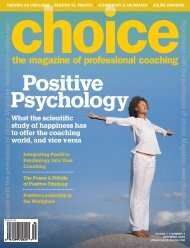Choice, The Magazine of Professional Coaching
Choice, The Magazine of Professional Coaching
Choice, The Magazine of Professional Coaching
You also want an ePaper? Increase the reach of your titles
YUMPU automatically turns print PDFs into web optimized ePapers that Google loves.
Reproduced with the permission <strong>of</strong> choice <strong>Magazine</strong>, www.choice-online.com<br />
EXPERT GUIDANCE ON CRITICAL COACHING ISSUES<br />
Helping a client<br />
overcome the<br />
“pleaser”mentality<br />
the situation<br />
the experts weigh in<br />
By Carol Adrienne, PhD<br />
Your brief description <strong>of</strong> his internal situation seems<br />
to indicate a nature that has been locked into performing.<br />
If he is the type who believes that his survival<br />
depends on doing in order to prove his worthiness,<br />
then he must first become aware <strong>of</strong> such tendencies. No<br />
doubt he’ll continue to be active and busy, but the goal is to<br />
make choices that bring more happiness!<br />
Over-busyness could serve him by feeding that drive to<br />
perform, so that he can feel he is being there for everyone –<br />
except, <strong>of</strong> course, for himself. Our culture teaches us at an<br />
early age that we need to be better, try harder, and take on<br />
more and more, at the risk <strong>of</strong> ignoring parts <strong>of</strong> ourselves<br />
that other parts don’t approve <strong>of</strong>. As his coach, avoid giving<br />
the impression that he needs to fix anything, because then<br />
this becomes another thing on his “to-do” list.<br />
Get him to associate to his body and to his feelings in<br />
sessions and throughout his day. Awareness <strong>of</strong> the present<br />
is always the first step in transformation. <strong>The</strong> body is<br />
a master coach – it never lies.<br />
It’s also important for him to become aware <strong>of</strong> his inner<br />
dialogue. For example, is his identity based on such beliefs<br />
as, “I can’t afford to lose this job,” “I have to maintain a high<br />
pr<strong>of</strong>ile in the community,” “People expect a lot from me,” or<br />
sticky<br />
situations<br />
“ My client is a successful business person with a demanding travel schedule, extensive<br />
family and community obligations, and a breakneck pace. He has a “pleaser” personality<br />
that has left him feeling overextended and out <strong>of</strong> control. He no longer feels he is doing<br />
his best in any situation. How can I help him discern which activities bring real joy and<br />
fulfillment, and develop the self-awareness and capacity to say ‘no’ to ones that don’t? ”<br />
Are you grappling with a sticky situation?<br />
You don’t have to go it alone. Let our senior coaches give you some different perspectives to consider.<br />
Email your situation to: editor@choice-online.com and put “sticky situations” in the subject line.<br />
“I can’t let anyone down”? Is his motivation to look good?<br />
Does he secretly feel that he will be sidelined if he doesn’t<br />
show constant enthusiasm and effort? Awareness sheds<br />
light on the underlying internal motivations at work when he<br />
is in the act <strong>of</strong> saying “yes” to something. Beliefs get locked<br />
in during childhood and continue to seem like reality.<br />
It’s fine to commit to something if it’s really important to<br />
you, but not all things are equally important. For example,<br />
spending a few hours with your child in activities that you<br />
both enjoy is more fulfilling than heading up the parent<br />
teacher association, no matter how worthy that activity.<br />
Your client needs to begin to discover and accept who he<br />
is, and let go <strong>of</strong> those activities that don’t give a sense <strong>of</strong><br />
authentic purpose and enjoyment. Priorities become<br />
apparent and change happens almost effortlessly.<br />
Sitting quietly for two to five minutes each morning or<br />
evening could help begin to bring his life into focus. Written<br />
to-do lists keep us on track, and allow us to be flexible<br />
when necessary. Suggest that he re-think multi-tasking.<br />
Studies show that trying to do more than one thing at a<br />
time is actually counter-productive.<br />
I’d also have him practice saying no whenever possible<br />
over the next few days or weeks. Suggest that he say no<br />
honestly, without making up phony excuses. Saying no<br />
when we want to say no is healthy, stress-relieving, and<br />
liberating. It may even help us live longer!<br />
VOLUME 8 NUMBER 2<br />
17<br />
Reproduced with the permission <strong>of</strong> choice <strong>Magazine</strong>, www.choice-online.com



